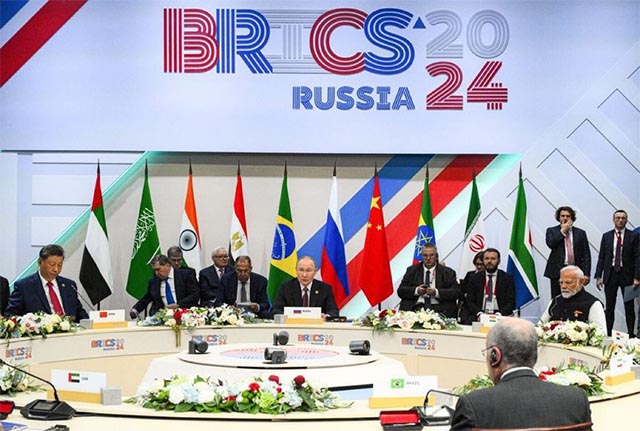
COMMENT | Patricia Kishemeire | The XVI BRICS October Kazan Declaration, underscores the emergence of new global power centers and a multipolar world order, offering significant opportunities for Uganda and Africa to reshape their global engagement. This shift represents a chance for African nations to reduce their dependence on traditional Western powers and expand alliances with emerging economies.
Multipolar World Order and Uganda’s Diplomatic Opportunities
The declaration’s emphasis on a multipolar world challenges Western dominance in global decision-making. For Uganda, this opens avenues to strengthen international relations beyond the West, fostering new partnerships with BRICS nations such as Brazil, Russia, India, China, and South Africa. This diversification could lead to more equitable trade agreements, increased investments, and greater diplomatic influence.
Push for Inclusive Global Representation
One of the key points in the Kazan Declaration is the call for equitable representation in international institutions, including the United Nations and the 25th chair at the IMF executive board for Sub Saharan Africa. For Uganda and other African countries, this resonates with long-standing demands for reform, particularly in the UN Security Council, where Africa remains underrepresented. Increased representation would give Africa a stronger voice in decisions related to trade, climate change, and peacekeeping.
As we can all recall, the non-Aligned movement was founded with the view of advancing the interests of developing countries as a call to reform Bretton woods institutions, BRICS has this pillar at the core of its foundation.
The BRICS focus on Emerging Markets and Developing Countries (EMDCs), including African nations, signals an opportunity for Uganda to play a more active role in global governance. With support for multilateralism and the United Nations, Uganda can leverage its position in peacekeeping and development initiatives to influence global policies that affect its future.
Security and Conflict Resolution: African Solutions for African Problems
The Kazan Declaration reinforces the principle of “African Solutions to African Problems,” underscoring BRICS’ support for African-led peace initiatives. Uganda, with its significant involvement in regional peacekeeping efforts such as in South Sudan and Somalia, stands to benefit from this endorsement. BRICS’ backing for the African Union and regional organizations could lead to increased resources for Uganda’s peace efforts, furthering its role as a stabilizing force in East Africa.
The recognition of African peacekeeping missions, including Uganda’s role in conflict resolution, highlights its contributions to regional stability. The declaration’s support for African peace initiatives could also encourage greater collaboration with BRICS nations, providing Uganda with more resources for peacebuilding and security.
This declaration, furthermore, underscores the importance of regional cooperation like SADC, while Uganda is not a member of SADC, the emphasis on cooperation within regional bodies to counter threats highlights the broader African approach to shared security challenges which Uganda’s president H.E Yoweri Kaguta Museveni has always emphasized , Uganda can align with the East African community , IGAD and other regional bodies to ensure regional growth and stability
Economic implications
In Africa, there are several regional economic blocs, they include ECOWAS in west Africa, SADC in southern Africa, the EAC in east Africa and most recently the Alliance of Sahel States (AES). Besides their domestic blocs, African countries are looking out for other partnerships to bolster their economic blocs. What are Africa’s economic challenges that blocs such as BRICS may help address?
Today, BRICS has 9 members including African countries of Egypt, Ethiopia and South Africa as Algeria awaits admission. The bloc also includes 3 of the top 5 global economies of China, India and Russia. The combined total share of BRICS in gross world product is at 60 trillion USD surpassing that of G7 and the bloc represents 45% of global population and 33% of the world’s land area implying robust market.
Access to funding
Africa and Uganda especially have been left to the whim of lenders like IMF and World bank, BRICS presents new financial alternatives such as the New Development Bank which supports public projects through equitable lending and participation. Through trading with BRICS, African countries could reduce dependency on the US dollar and lessen the vicious debt burden and sanctions.
The BRICS -Africa Grain Exchange – a game changer for Agricultural investment in the face of Climate change, fragmented markets and food insecurity
The establishment of a grain exchange would be a game changer for Africa in stabilising grain prices as BRICS would provide a more structures market , reducing price volatility for both producers and consumers. For Uganda, which already has a growing export market for coffee and tea, BRICS- backed exchange would diversify export options bettering the country’s export basket and foreign exchange.
Youth Empowerment and Political Cooperation
With Africa’s youthful population, the BRICS Youth Summit and the establishment of a BRICS Youth Council represent critical opportunities for Uganda. These initiatives could help integrate Uganda’s young people into global dialogues, leadership programs, and entrepreneurial ventures, enhancing their roles in the country’s development.
The commitment to inter-parliamentary cooperation also offers Uganda a platform to engage with emerging economies on governance, political stability, and policymaking. This exchange of ideas could strengthen Uganda’s political institutions and foster better governance practices.
Urbanization, Infrastructure, and Women’s Empowerment
The BRICS focus on urbanization and infrastructure development is closely aligned with Uganda’s needs as it experiences rapid urban growth. Through city partnerships and forums for local governments, Uganda could improve its urban planning, invest in smart cities, and address challenges associated but not limited to rapid urbanization
Additionally, the declaration’s emphasis on women’s empowerment aligns with Uganda’s gender equality goals. BRICS initiatives promoting women’s participation in leadership, entrepreneurship, and governance could bolster Uganda’s efforts to increase women’s roles in these critical areas.
There are other endorsements on industrialisation, and Climate change.
THEREFORE, The XVI BRICS Kazan Declaration presents a significant opportunity for Uganda and Africa to strengthen their roles in global governance and development. The shift toward a multipolar world, combined with BRICS’ support for African solutions and greater representation in international institutions, offers Uganda a platform to assert its influence on key global issues. Enhanced cooperation in security, youth engagement, infrastructure development, and women’s empowerment further underscore the declaration’s potential to shape Uganda’s future development.
******
 Patricia Kishemeire is Special Representative of the BRICS Municipal Forum
Patricia Kishemeire is Special Representative of the BRICS Municipal Forum
 The Independent Uganda: You get the Truth we Pay the Price
The Independent Uganda: You get the Truth we Pay the Price





